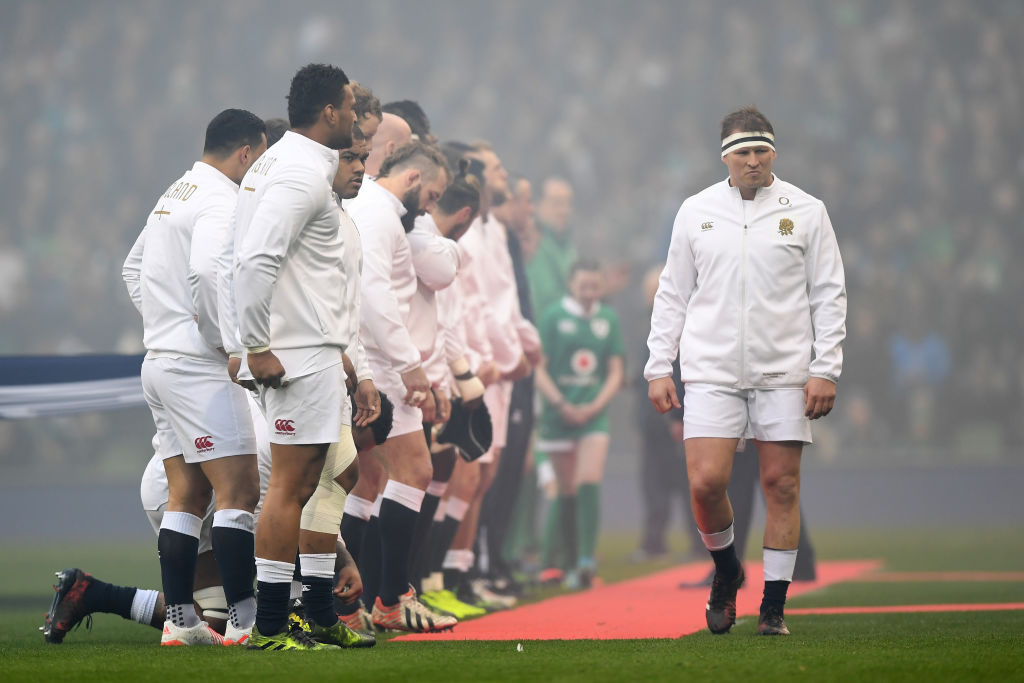Probyn column: Dylan Hartley a hard man? Not with his record

DUBLIN, IRELAND - MARCH 18: Captain Dylan Hartley of England and his team line up for the national anthems prior to kickoff during the RBS Six Nations match between Ireland and England at the Aviva Stadium on March 18, 2017 in Dublin, Ireland. (Photo by Shaun Botterill/Getty Images)
With the restarting of the Premiership, even if behind closed doors, we have at last some rugby to talk about and look forward to.
After the enforced protracted break, it’s similar to the start of a new season with many players off the pace of the game. This is not helped by the new interpretation of breakdown laws that referees have just started to enforce in what is effectively three quarters of the way through the season.
Given the short time that players have had to prepare for the re-start, it would have made more sense to have left the game as it was until the beginning of the next season, giving both players and coaches the chance to adapt.
It will take a few games before everybody is back to where they were before lockdown and build a partnership with the number of newly-signed players, whose transfers would usually take place only at the end of season and during pre-season.
Even though I disagree with the need to finish last season, particularly as there have been so many changes in personnel at a number of clubs making it hardly a fair representation of what would or could have happened had the season been completed in the usual time, of course, it’s good to see the game back again, even with more added water breaks.
The certainty of Saracens going down should have seen all the other clubs use the opportunity to experiment with some of their young talents but it seems they will be using these games to get established players back up to speed and ‘blood’ the new signings ready for what will be a big season starting this autumn.
One thing these games will show is if the idea of a global season does have a realistic chance of happening with the clubs playing during the time players in this hemisphere are usually taking a break.
Although because of the lockdown, we lack the opportunity to see if the paying public would have embraced rugby in the summer instead of their traditional summer fare, it does give us an insight to how players will cope with the heat at this time of year.
There is no doubt that it would change how the game is played with firmer pitches and less rain-soaked balls disrupting handling, even if last week’s opening game, Quins v Sale, was a wet and sticky affair.
Without the crowds to support their clubs there is a feeling that the restarted game is a bit of a sham rather like the latest autobiography that has been released by Dylan Hartley.
His book, The Hurt, has some interesting views but nothing new, while attempting to justify a career cut short by injury and suspensions.
There is a part of me that can’t help thinking that the injuries and the suspension he received during his career may be linked.
Some have described him as a hard man of the game. I disagree as there is nothing hard about the deliberate acts of violence he designed to seriously injure other players who are trapped in either a ruck or a maul and unable to protect themselves, something he admits he did even at U19s level!
Rugby has always had what could be called a code of acceptable behaviour among players – the odd punch, a bit of over enthusiastic rucking – but there have always been areas that were, and are, unacceptable to all, which includes gouging.
If a team had a known ‘gouger’ he would be subjected to some ferocious rucking throughout the game and without any protection from his own team.
Yes, the game of rugby can sometimes erupt into a mass punch-up, usually if someone oversteps the mark, although not as often in these modern times with citing officials and more cameras identifying the wrong doer.
Hartley protests in the quoted sections that his suspensions were, in part, because the discipline section of the RFU was unfit for purpose and out of date, which is laughable.
Having sat on the panel that banned him for six months for eye gouging in 2007, I disagree.
The current president of the union Jeff Blackett, a High Court judge and former player headed the panel. We watched numerous videos of the incidences (I say incidences because he gouged three people in the same game) and then we took statements from fellow international players who were part of the opposition and victims of his assaults.
It is not unusual for fellow internationals to support each other even when testifying against each other – but this was certainly not the case, with his colleagues calling for a lengthy ban.
The thing is, Hartley wasn’t a bad hooker and didn’t need to use gouging and biting etc, but probably thought he need something extra in his game after admitting he left New Zealand because he said he felt he would not have been good enough to have had a professional rugby career there.
Unfortunately, occasional injuries are something that are a part of the game and have been since its inception, as a walk round the ERIC room at Twickenham on a match day will testify.